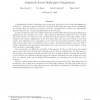Free Online Productivity Tools
i2Speak
i2Symbol
i2OCR
iTex2Img
iWeb2Print
iWeb2Shot
i2Type
iPdf2Split
iPdf2Merge
i2Bopomofo
i2Arabic
i2Style
i2Image
i2PDF
iLatex2Rtf
Sci2ools
134
click to vote
STOC
1996
ACM
1996
ACM
Adaptively Secure Multi-Party Computation
A fundamental problem in designing secure multi-party protocols is how to deal with adaptive adversaries i.e., adversaries that may choose the corrupted parties during the course of the computation, in a setting where the channels are insecure and secure communication is achieved by cryptographic primitives based on the computational limitations of the adversary. It turns out that the power of an adaptive adversary is greatly a ected by the amount of information gathered upon the corruption of a party. This amount of information models the extent to which uncorrupted parties are trusted to carry out instructions that cannot be externally veri ed, such as erasing records of past con gurations. It has been shown that if the parties are trusted to erase such records, then adaptively secure computation can be carried out using known primitives. However, this total trust in parties may be unrealistic in many scenarios. An important question, open since 1986, is whether adaptively secure mu...
Related Content
| Added | 08 Aug 2010 |
| Updated | 08 Aug 2010 |
| Type | Conference |
| Year | 1996 |
| Where | STOC |
| Authors | Ran Canetti, Uriel Feige, Oded Goldreich, Moni Naor |
Comments (0)

